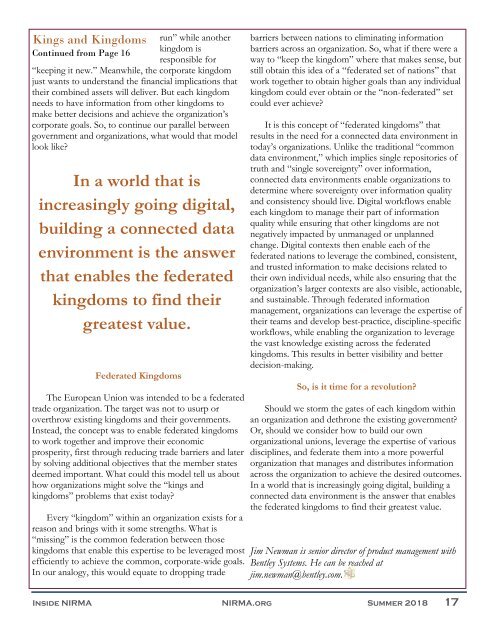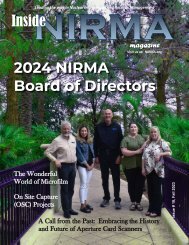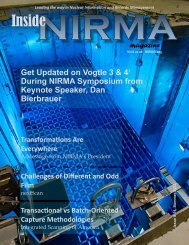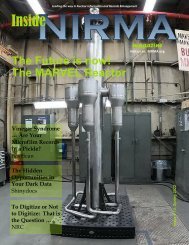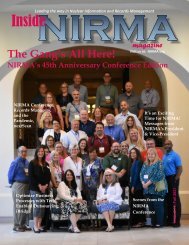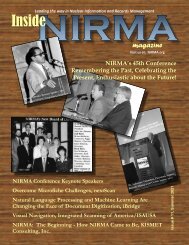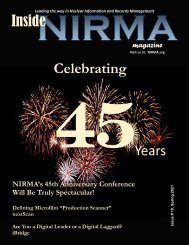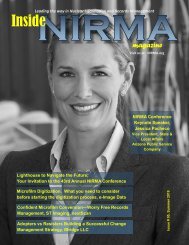Inside NIRMA Magazine Summer 2018 - FINAL
You also want an ePaper? Increase the reach of your titles
YUMPU automatically turns print PDFs into web optimized ePapers that Google loves.
Kings and Kingdoms<br />
Continued from Page 16<br />
run” while another<br />
kingdom is<br />
responsible for<br />
“keeping it new.” Meanwhile, the corporate kingdom<br />
just wants to understand the financial implications that<br />
their combined assets will deliver. But each kingdom<br />
needs to have information from other kingdoms to<br />
make better decisions and achieve the organization’s<br />
corporate goals. So, to continue our parallel between<br />
government and organizations, what would that model<br />
look like?<br />
In a world that is<br />
increasingly going digital,<br />
building a connected data<br />
environment is the answer<br />
that enables the federated<br />
kingdoms to find their<br />
greatest value.<br />
Federated Kingdoms<br />
The European Union was intended to be a federated<br />
trade organization. The target was not to usurp or<br />
overthrow existing kingdoms and their governments.<br />
Instead, the concept was to enable federated kingdoms<br />
to work together and improve their economic<br />
prosperity, first through reducing trade barriers and later<br />
by solving additional objectives that the member states<br />
deemed important. What could this model tell us about<br />
how organizations might solve the “kings and<br />
kingdoms” problems that exist today?<br />
Every “kingdom” within an organization exists for a<br />
reason and brings with it some strengths. What is<br />
“missing” is the common federation between those<br />
kingdoms that enable this expertise to be leveraged most<br />
efficiently to achieve the common, corporate-wide goals.<br />
In our analogy, this would equate to dropping trade<br />
barriers between nations to eliminating information<br />
barriers across an organization. So, what if there were a<br />
way to “keep the kingdom” where that makes sense, but<br />
still obtain this idea of a “federated set of nations” that<br />
work together to obtain higher goals than any individual<br />
kingdom could ever obtain or the “non-federated” set<br />
could ever achieve?<br />
It is this concept of “federated kingdoms” that<br />
results in the need for a connected data environment in<br />
today’s organizations. Unlike the traditional “common<br />
data environment,” which implies single repositories of<br />
truth and “single sovereignty” over information,<br />
connected data environments enable organizations to<br />
determine where sovereignty over information quality<br />
and consistency should live. Digital workflows enable<br />
each kingdom to manage their part of information<br />
quality while ensuring that other kingdoms are not<br />
negatively impacted by unmanaged or unplanned<br />
change. Digital contexts then enable each of the<br />
federated nations to leverage the combined, consistent,<br />
and trusted information to make decisions related to<br />
their own individual needs, while also ensuring that the<br />
organization’s larger contexts are also visible, actionable,<br />
and sustainable. Through federated information<br />
management, organizations can leverage the expertise of<br />
their teams and develop best-practice, discipline-specific<br />
workflows, while enabling the organization to leverage<br />
the vast knowledge existing across the federated<br />
kingdoms. This results in better visibility and better<br />
decision-making.<br />
So, is it time for a revolution?<br />
Should we storm the gates of each kingdom within<br />
an organization and dethrone the existing government?<br />
Or, should we consider how to build our own<br />
organizational unions, leverage the expertise of various<br />
disciplines, and federate them into a more powerful<br />
organization that manages and distributes information<br />
across the organization to achieve the desired outcomes.<br />
In a world that is increasingly going digital, building a<br />
connected data environment is the answer that enables<br />
the federated kingdoms to find their greatest value.<br />
Jim Newman is senior director of product management with<br />
Bentley Systems. He can be reached at<br />
jim.newman@bentley.com.<br />
<strong>Inside</strong> <strong>NIRMA</strong> <strong>NIRMA</strong>.org <strong>Summer</strong> <strong>2018</strong> 17


